ADRA Slovakia, a non-governmental organisation in Slovakia with 27 years of experience in implementing humanitarian, developmental and volunteering projects for those in need in Slovakia and abroad. ADRA Slovakia aims to help people lead dignified and free lives while better preparing them for a possible humanitarian crisis.
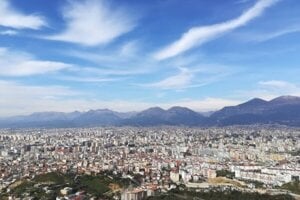 Blog: We can't close our eyes to the inequality accentuated by COVID-19 Read more
Blog: We can't close our eyes to the inequality accentuated by COVID-19 Read more The EU Aid Volunteers Initiative brings professionals and organisations together from different countries, providing practical support to humanitarian aid projects and contributing to strengthening local capacity and resilience in disaster-affected communities. ADRA Slovakia is the sending organisation of three EU Aid Volunteers in Albania. What exactly does this mean? In a nutshell, besides dealing with some project paperwork and related financial administration, we monitor their deployment on a monthly basis. We call together every month and discuss how the activities they are doing have progressed and what has been achieved. It is our obligation to carefully listen to them, to inquire about their well-being and help them to deal with their concerns. Our responsibility is to keep them safe and support them from a distance as effectively as possible.
Like everywhere else in the world, the pandemic outbreak interrupted our daily lives and brought about many challenges. In the case of our volunteers, the first dilemma we faced together was making a decision for or against repatriation. All of our volunteers originate from countries that are heavily affected by the pandemic. Laura is from Italy, Arantxa from Spain and Cyriakus from Germany.
Since Albania put some strict measures in place in the beginning and the situation in their home countries was much worse, all of them decided to stay and hope that the situation will return to normal in the near future.
How is the situation being dealt with in Albania?
In March and early April, we asked Laura, Arantxa and Cyriakus for some statements.
Cyriakus Bräutigam, project assistant at ADRA Albania:
"After the first positive cases were made public in March, the Albanian government immediately took comprehensive measures to flatten the curve. Since then, we can observe that (for somewhat obvious reasons) the approach applied in the Italian red zones is copy-pasted. A state of emergency has been declared and violations of curfews and bans on gatherings are punished with substantial fines. It seems reasonable, bearing in mind that the Albanian health system is woefully ill-equipped to cope with the pandemic.
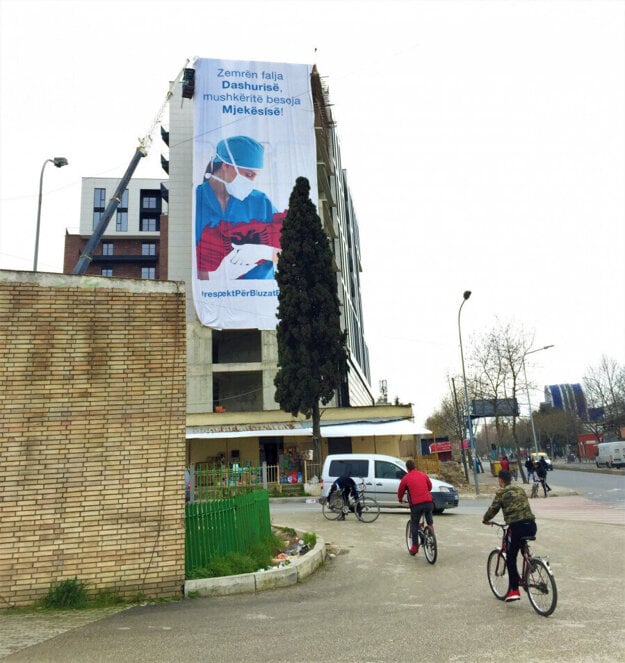 Street scene in Tirana. The billboard says: “Give your heart to love, and for your lungs trust Medicine.” (Source: Cyriakus Bräutigam)
Street scene in Tirana. The billboard says: “Give your heart to love, and for your lungs trust Medicine.” (Source: Cyriakus Bräutigam)"From an epidemiological point of view, however, it remains unclear how exactly the bulletproof military vehicles equipped with MGs parked at the checkpoints are contributing to improving the situation. In any case, it fits the political narrative of being at war with the enemy, COVID-19.
"Concerning ADRA’s work during the first few weeks, all of our projects were put on hold and it was virtually impossible to directly access our target groups. The German Foreign Ministry offered me repatriation but I decided to stay - a decision I considered thoroughly and don't regret. I am not a burden for anyone here and feel committed to find ways on how to continue our projects and to support our target group: People who (after the earthquake) are now affected by yet another emergency situation,” said Bräutigam.
Laura Naw, the project assistant at Adra Albania:
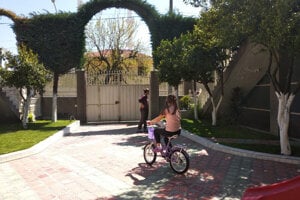 Blog: Everybody needs good neighbours Read more
Blog: Everybody needs good neighbours Read more "The Albanian government adopted wide-ranging emergency legislation that imposes fines for violations of measures intended to combat the spread of the coronavirus. So, the government created an atmosphere of fear. Although the Albanian police fined many people and car drivers for violating restrictive COVID-19 measures, one day, the Albanian government waived all fines imposed. It has been awkward to read that news because the government is not sending a “healthy” message to those who have respected the curfew.
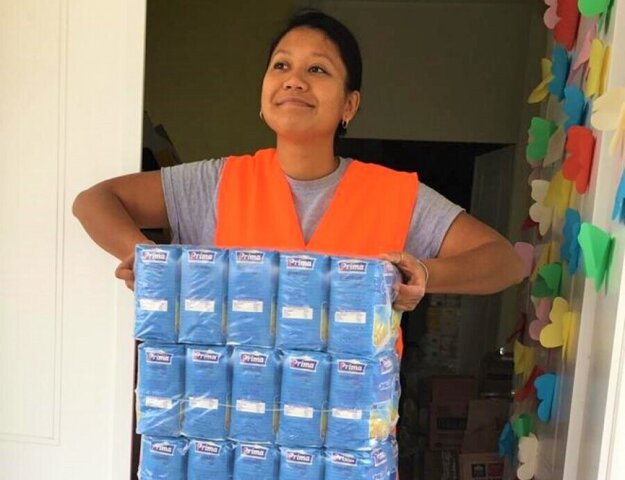 During the pandemic, volunteer Laura Naw helped organise and supply food and hygienic parcels for people in need. (Picture: © Laura Naw) (Source: Laura Naw)
During the pandemic, volunteer Laura Naw helped organise and supply food and hygienic parcels for people in need. (Picture: © Laura Naw) (Source: Laura Naw)“However, I assume that managing the situation in Albania has been pretty easy. Albania is a really small country and underdeveloped from the point of view of infrastructure. In fact, it doesn't have any railroad tracks and has only one airport. Tirana International Airport Nënë Tereza (named after Roman Catholic nun and missionary Mother Teresa) has been the sole international air gateway into Albania. So, with all the measures taken, like the closure of borders, the ban on international flights and travel from one town to another town, the use of private cars and public transportation allowed the country to manage the situation in a pretty good way. Currently, the rate of affected people is low and the number of fatalities, according to the latest news, is 31,” said Naw.
Arantxa Ferrer, a physiotherapist at the National Centre for Community Services
“In Albania, the authorities started to think about imposing a strict lockdown since the first two people were infected. The measures seemed very confusing and chaotic to me. I think they tried to act very fast as the poor health system would quickly reach its capacity limits in case of a far-reaching spread of the epidemic. The government was “copying” the measures of neighboring countries, but with much less active cases of COVID-19.
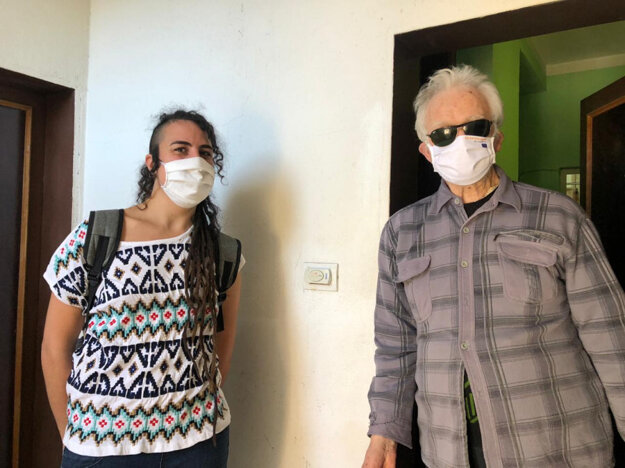 Arantxa Ferrer distributed face masks to older people, since there is a shortage of them in Tirana. (Source: Arantxa Ferrer)
Arantxa Ferrer distributed face masks to older people, since there is a shortage of them in Tirana. (Source: Arantxa Ferrer)“Moreover, the government promised to build a COVID-hospital in 30 days (they just finished now, but it is no longer operative). They established a window of “free movement” from 6:00 to 13:00 and from 16:00 to 18:00. After some changes in the schedule, they decided to people/families to go out a maximum of one hour per day. Besides the strict measures and the fear that we can smell in the politician's words, I feel that the police in the streets were not really trying to repress as much as possible. Also, it wasn’t really clear what and how they could punish people since the measures were continuously changing and announced by live videos on the prime minister’s social networks,” said Ferrer.
A new flatmate moved in - welcome Corona!
The first weeks of strict lockdown and curfew prevented the volunteers from carrying out their jobs. Arancha, who is a physiotherapist and needs direct contact with her clients, couldn’t do anything. Laura and Cyriakus could do some of their work remotely, e.g. project writing. However, all of them suddenly needed to stay at home alone.
Despite the fact that the coronavirus took from us the work we like, the hobbies and friends we spent time with, it brought us something new at the same time.
Laura, after having spent six months in Albania, finally got to know her neighbors. She hadn’t even known their names before. Now, thanks to the coronavirus, her neighbors bring her lunches and breakfast. Moreover, respecting the necessary physical distance, they went hiking together recently and walked around the artificial lake of Tirana.
The quarantine or self-isolation we had in Slovakia and the curfew in Albania was a huge challenge for our mental health.
Cyriakus set a personal regime to keep his mind fresh: “My tactic to cope with the situation is to create some kind of a daily routine: standing up and going to bed at the same time, doing push-ups, preparing food at fixed times, staying on the balcony as long as possible. With moderate success, I was trying to finally read all the books I never had the time for rather than watching shows on Netflix (For some reason, I could really identify with Kadare’s novel Girl in Exile). Fortunately, thanks to the technology of the 21st century, physical distance does not equal social distance, enabling me to talk with my family and friends on a regular basis.”
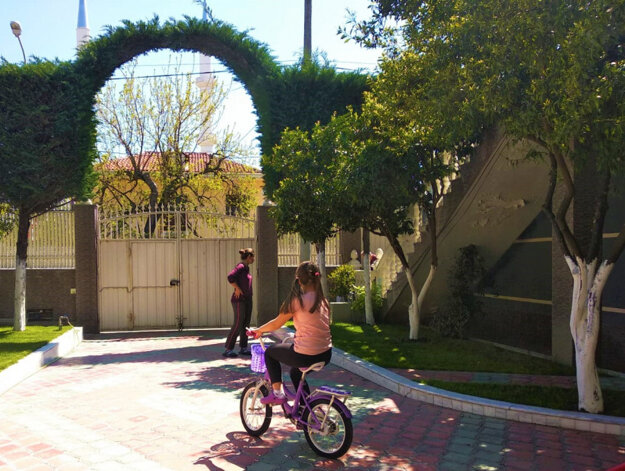 Laura's neighbors, who she got to know thanks to the quarantine during the coronavirus pandemic. (Source: Laura Naw)
Laura's neighbors, who she got to know thanks to the quarantine during the coronavirus pandemic. (Source: Laura Naw)Arancha approached the new reality in a similar way: “I tried to keep active, working out everyday, speaking a lot with my friends and family and studying by myself. I only stayed in quarantine for three weeks. After that, I started to volunteer with the municipality.
These days, when the whole world calms down, we can find time to look back, to realise how vulnerable we are. Moreover, our volunteers who worked on a daily basis with vulnerable groups such as the Egyptian and Roma community in Tirana or people with mental and physical disabilities who live in very poor conditions, realised how much more dangerous the pandemic is for these groups.
“I had hard moments during quarantine, living alone as my colleagues did. Anyway, it was pretty easy for us volunteers to comply with this measure. But I don't want to imagine those who have to keep paying rent; those who depend entirely on their business to bring food into their homes; or, as we can see a lot in the streets of Tirana, those who have to go out and try to get some coins for that same day“, Arancha shares her concerns.
Humanitarian volunteers in action. Literally.
Prior to their deployment as volunteers, Arantxa, Laura and Cyriakus received comprehensive training by the European Commission in Pisa and Vienna, where emergency situations have been simulated. After the earthquake in November 2019, it is already the second time that they are able to apply the principles learned and move from theoretical knowledge to first-hand experience.
Once the measures were gradually scaled back, our volunteers took the opportunity to help. They joined activities that were focused on responding to this humanitarian crisis and mitigating the negative impacts of COVID-19.
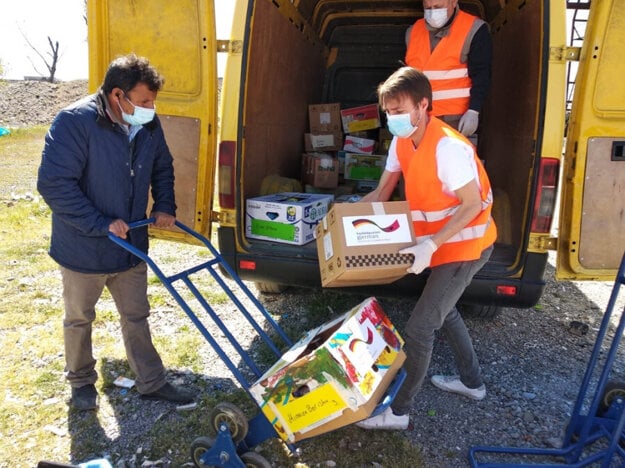 During the pandemic, Cyriakus Bräutigam helped to organise and supply food and hygienic parcels to people in need. (Source: Cyriakus Bräutigam)
During the pandemic, Cyriakus Bräutigam helped to organise and supply food and hygienic parcels to people in need. (Source: Cyriakus Bräutigam)Cyriakus did not hide his joy that after weeks of complete isolation and a de facto standstill of ADRA’s activities, some kind of routine slowly began to return. "Being able to walk to the office every morning is a real blessing for my colleagues and me. I am relieved that in cooperation with the German Embassy, we are finally able to regularly provide food and WASH-supplies to the Roma and Egyptian communities. Furthermore, we set up a helpline to provide psychosocial support for people suffering from PTSD (or those who just need someone to talk to)," he said.
Since Education is a common denominator in all of ADRA’s interventions, the most urgent issue to be addressed is to find ways to explore innovative solutions such as distance and e-learning. "This requires a great deal of creativity and unorthodox thinking. I am, therefore, all the more pleased that we have been able to use this time of isolation to develop some promising project proposals and to apply to open calls. I think we are on the right track and I am cautiously optimistic,” Cyriakus added.
NCCS, Arancha’s hosting organisation, started to cooperate with the municipality through the project “Adopt a grandmother/grandfather”. From 9:00 to 13:30, volunteers prepare food for people without good economical resources and go shopping for people who cannot go outside, mostly those older than 65 or those with a disability.
“I really enjoyed being engaged in the volunteering activities of the municipality. I have the opportunity to better understand what is going on in society. I and another volunteer were part of a local team, so I learned much more about the language and the culture,” said Arantxa.
From bad situations, you can always learn something
On a final note, Arantxa stated: ”I am somehow grateful for being here and seeing that the situation didn’t become worse. In addition, I had the opportunity to better learn Albanian with my new colleagues and discover a lot of hidden places in Tirana thanks to the work of food distribution."
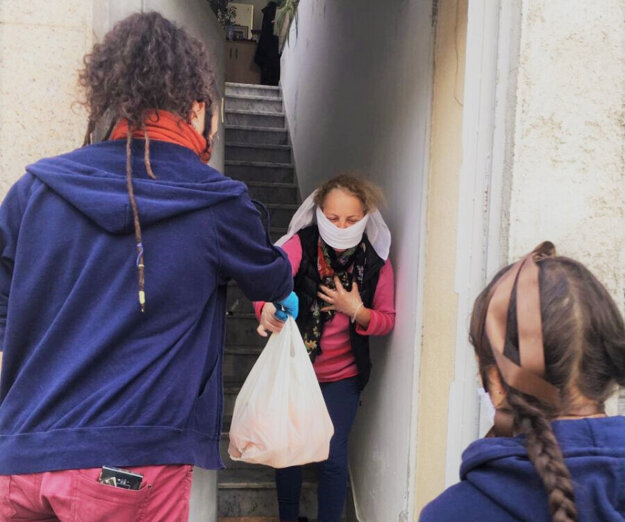 Arantxa Ferrer (left) together with another volunteer joined the initiative "Adopt a grandma/ grandpa" within which they distributed food to seniors (Source: Arantxa Ferrer)
Arantxa Ferrer (left) together with another volunteer joined the initiative "Adopt a grandma/ grandpa" within which they distributed food to seniors (Source: Arantxa Ferrer)Laura said that she has been so lucky to have a garden where she can chill out and focus on her well being during this lockdown: “At the beginning of the lockdown, I planted two avocado seeds and four pots of basil. Caring for these plants provided a sense of purpose and distraction, and it’s mentally rewarding to see the basil thrive and the avocado put down roots. I learned new techniques for managing my stress so I don’t drive myself crazy. I do agree with the statement that “from bad situations, you can always learn something.”
We can all agree on that.
Cyriakus Bräutigam, Laura Naw, Arantxa Ferrer
Nikola Gurgoľová, Veronika Zimová
Cyriakus, Laura and Arantxa have been volunteers in Albania since 2019 with the partner organisations NCSS and ADRA Albania under the EU Aid Volunteers program. ADRA Slovakia is their sending organisation.
Author: ADRA Slovakia






